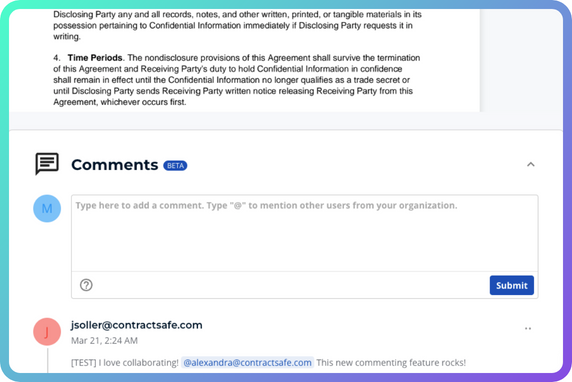![]()
The business world is in a constant state of evolution. Certainly, many changes, such as high-tech machinery, precision manufacturing, and automated contract management software - just to name a few - result from improved technology. In fact, many American companies focus almost entirely on technological innovation.
However, other changes in business can be based on the evolution of management philosophy or societal trends, rather than changes in technology. For example, companies now take greater interest in the environmental impact of decisions and strategies. Individual workers change jobs more frequently than in the past, and often work as independent contractors, rather than employees.
All of these categories of change affect the volume and the types of contracts entered into by a company. After all, written contracts are a necessity, allowing a company to memorialize and document agreements with stakeholders, protect the enterprise’s assets, and manage risk.
Given the ever-increasing complexity of business and contractual relationships, it should come as no surprise that companies are required to manage more contracts than ever before. In this article, we’ll discuss some common types of contracts, as well as some ways in which contract management software can be useful.
Vendor Agreements
A vendor agreement is a contract between a business and a supplier. These contracts can be relatively simple, or extremely detailed, depending on the needs of the parties. With supply chains now spanning the world, the importance of well-crafted vendor agreements is more important than ever.
Sales Contracts
Sales agreements memorialize the terms of a sale, such as price, time of payment, refund policy, and financing arrangements, and are especially common in transactions that involve sales to consumers. Examples include automobiles and homes.
Companies that utilize sales contracts and vendor agreements often must manage large numbers of documents - but storing paper contracts in file folders and searching for them when they are needed is inefficient. With ContractSafe contract management software, these contracts are all stored in a centralized repository. That allows them to be accessed by anyone given permission from anywhere with a computer and an internet connection. Using OCR technology, all of the company’s contracts can then be speed searched using Google-type word searches.
Confidentiality and Non-Disclosure Agreements (NDAs)
In these contracts, one or more parties agree not to disclose specific information to third parties. Such contracts are especially useful for companies that rely on proprietary technology or processes, or need to protect other secret information. Confidentiality agreements can also be used to protect private information, such as terms of a legal settlement.
Employment Contracts
Employment agreements usually set forth all the terms of the relationship between employer and employee, including salary, benefits, and work obligations of the employee. Employment contracts often contain information that the company wishes to keep private from most other employees.
With ContractSafe contract management software, the company decides who has access (with unlimited users permitted), and permissions can be limited for various employees as determined appropriate by management. That way, proprietary information in confidentiality agreements and private information in employment contracts will only be available to those permitted access by management.
Non-Compete Agreements
Non-compete agreements provide that an employee who leaves the company will not compete against it within a specified geographical area for a specified period of time. Employment agreements and non-compete agreements can be entered separately, or the non-compete provision may be a clause within the employment agreement.
Given that employees move from one job to another far more frequently now than ever, non-compete clauses allow a company to protect itself from an employee taking institutional knowledge or trade secrets to a competitor, or using such knowledge to start a competing business.
Lease Agreements
In the business world, lease agreements are especially common for commercial real estate. These contracts include a lease term, the amount of rent, and other details of the rental.
Importantly, lease agreements sometimes include auto-renewal provisions. Many companies have been known to lose track of relevant auto-renewal dates, thereby inadvertently renewing a lease automatically (or missing an opportunity to renew at a lower price).
ContractSafe contract management software provides automatic tracking for such provisions. The system provides automatic email reminders and maintains a calendar of important dates so that the company never loses track of an automatic renewal provision again.
Partnership Agreements
A partnership can be as simple as two people forming a business and sharing management, profits and costs equally. Partnerships can also have complex arrangements with numerous partners. There may be complex calculations to determine ownership interest, profit, and expenses.
Management responsibilities may be defined very specifically. Thus, partnership agreements are essential. Additionally, formation documents are necessary in memorializing business arrangements for other business entities, such as corporations, limited partnerships, limited liability companies, or one of several other types of business entities.
Written contracts have become more common than ever, and for good reason. With so many types of contracts, you may be worried that you need to buy a bunch of filing cabinets to store them all. Not so! With ContractSafe, you’ll have all of your contracts safely stored and available at the touch of a keyboard. And the system is so easy to implement and so easy to use, you’ll have complete buy-in from the get-go. Start your free trial today!

















